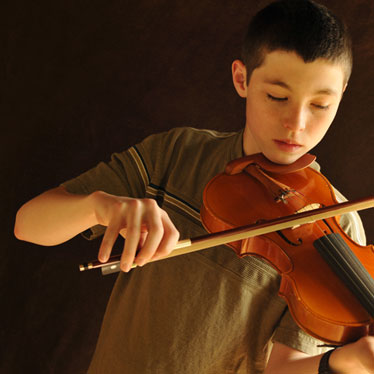How to Create a Balanced Practice Schedule for Your Child This Summer

Do your kids view summer break as a vacation from everything, including practicing their string instrument? Alas, developing musicianship requires a consistent practice schedule in order to keep “in shape,” and that includes holiday breaks and vacations.
If this is unwelcome news for your young string musician, we have tips for creating a balanced practice schedule that ensures students enjoy summer break freedom – and fun - while keeping up with their music studies.
Set their rehearsal times for their personal best times of day
We all have our favorite – or most productive – time of day. For some, it’s first thing in the morning or the late afternoon. For others, peak focus and energy time may be right, smack in the middle of the day. Give your child some autonomy in selecting when they practice, so they benefit from practicing their string instrument during a time that’s best for them, rather than the only time of day that worked with school, work, studying, sports, and homework demands.
If your child is an early bird or later-night owl, read, How to Practice at Home Without Making Your Family Crazy, which includes tips for creating a soundproof practice space.
Incorporate some private lessons into the mix
Many students cancel private lessons over the summer because summer travel schedules make it too difficult to maintain their standard weekly lessons. This means the private music instructors near you have more openings in their schedule to work with your child.
The upcoming summer break offers the chance for young string players to work one-on-one with someone they enjoy, helping them to meet a summertime goal or two, whether it’s to correct a “bad habit,” to branch out into a different genre, or to play songs from the student’s wish list that are arranged for their playing level.
Make busking part of “practice time”
Is your string musician a ‘tween or teen? The combination of warm, sunny weather and a freed up daytime schedule means more windows to play their instrument out and about around town. They can take their instrument solo, or join up with a friend or two. You can help them find appropriate areas for busking, and parents can take turns keeping an eye on them if kids are on the younger side.
Busking is like a practice session and performance experience all wrapped up together, along with an opportunity to earn money for the college or car fund. Read, “…Learn the Art of Busking…,” for tips on how to busk in legally and safely in your community.
Send them to summer music camp
If your child hasn’t attended summer music camp before, we highly recommend it. Music camps are fun, and they provide the opportunity to stretch learning and playing abilities in new and different directions. Camp also equates with automatic music practice. In addition to classes, seminars and performances, your child will play all day long, jamming with other camp attendees.
Work on skill sets that typically fall by the wayside
If your child is classically trained or is playing in a school orchestra that emphasizes classical techniques, summer provides a more spacious chance to follow their musical heart.
Unless your child is brand new, consider giving them a technique “break” of sorts, encouraging them to focus on other skill sets that support excellent musicianship. Examples include:
- Learning to play better by ear, rather than depending on sheet music
- Improving your improvisational skills
- Exploring other music styles and genres with your instrument (folk, bluegrass, jazz, rock, hip hop, etc.)
The internet has all kinds of free resources for string students, which gives your child their screen time fix as well.
Create time for ensemble practice
Practicing alone isn’t nearly as fun as practicing as a group. Contact the parents of your child’s favorite instrument-wielding friends and see if you can coordinate a group practice time once or more per week. In addition to being more inspiring, rehearsing with others commits your child to specific rehearsal times. Practicing ensemble- or chamber-style is excellent ear practice, building listening skills necessary to playing in sync with others, be it a duet or an orchestra. Plus, you can take them all out for a smoothie or their favorite hangout afterwards as a way to entice them to cooperate.
Collaborate with your child and use this summer break as a pathway to creative practice sessions, so your child continues falling in love with their string instrument and the music-learning process. By doing so, you’ll strike the perfect balance between work (aka practice) and fun.


